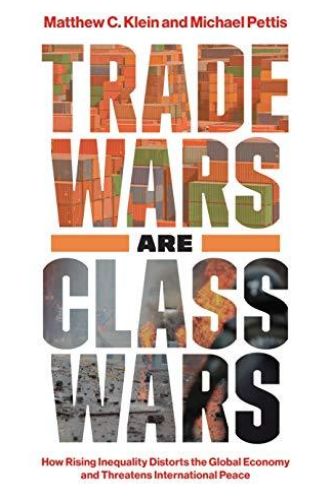Economists Matthew C. Klein and Michael Pettis reveal the surprising – and seldom reported – connections between ever-growing inequality and how governments deal with their trade surpluses.

The Haves and the Won’t-Gets
Economics commentator at Barron’s Matthew C. Klein and senior fellow at the Carnegie Endowment for International Peace Michael Pettis illuminate the relationships between trade and financial flows that affect the well-being of nations. The authors’ investigation of Chinese and German trade surpluses, and their impacts on the rest of the world, confronts how domestic inequality finances development and creates inequities in trade-deficit countries such as the United States.
The authors make the compelling point that income-distribution policies that serve the interests of business and political elites – to the detriment of ordinary people – are de facto class warfare, which causes trade disputes and imperils global peace.
Income Inequality
When a country’s exports of goods and services are greater than its imports, a crucial mechanical law in economics dictates that financial flows – which represent the purchase of foreign assets instead of imports – will balance the difference.
Rising inequality has produced gluts of manufactured goods, job loss and rising indebtedness.Matthew C. Klein, Michael Pettis
Exporters are paid for what they sell abroad; for example, the dollars that Chinese companies get from selling their goods in American markets are worth nothing unless the companies exchange those dollars for something else of value. So if China’s imports are less its exports, China spends the difference buying assets with its surplus foreign cash.
Development Models
Klein and Pettis explain that, in the “high-wage model,” poorer countries receive inflows of manufactured goods and capital from richer countries, while poor nations’ natural resources and industrial strategies make investment in them attractive.
Popular antipathy to trade therefore stems from the failure of international capital to go where it is needed in forms that are useful.Matthew C. Klein, Michael Pettis
Under the “high-savings model,” countries amass capital by transferring resources away from domestic consumers, allowing businesses, elites or government to capture the difference. Workers and consumers lose in the short term, but national development raises living standards in the long run.
The need to find outlets for ‘surplus capital which cannot find sound investments within the country’ was the central explanation for American and European imperialism.Matthew C. Klein, Michael Pettis
For example, Japanese workers, domestic consumers and retirees subsidized Japan’s industrial development as the financial system transferred purchasing power from households to businesses. This worked because Japan allocated productivity gains to workers while holding down executive pay.
China
Chinese households consume less than 40% of Chinese output; Klein and Pettis note that a figure of around 70% is the worldwide norm. China’s regressive tax system, collective bargaining ban and restrictions on the rights of internal migrant workers contribute to its inequality.
Systematic transfers of wealth from Chinese workers to Chinese elites distort the Chinese economy by strangling purchasing power and subsidizing production at the expense of consumption. That in turn, distorts the global economy by creating gluts of manufactured goods.Matthew C. Klein, Michael Pettis
Less money to workers means more money for the rich, which drives China’s high savings rates. The low share of national income going to ordinary consumers impedes other countries, such as the United States, from selling to Chinese markets.
The 2008 financial crisis and subsequent recession meant a sharp drop in Western demand for Chinese exports. To prevent mass unemployment, China replaced lost export revenue with more domestic investment. An economic downturn could force the government to reduce the yuan’s value and return to essentially exporting its problems.
Germany
The authors describe how German reunification and the opening of Eastern Europe to German investment pulled down wages, and how the rich got richer. Taxes on the rich and property taxes are light; inheritance taxes are meager.
More than one-quarter of the value German workers generated was sent abroad before 2008. The post-2008 recession saw Spain, Italy, Greece and Ireland experience property bubble collapses, government fiscal crises and sharp recessions. These EU countries suffered long, painful adjustments.
This process depended on the willingness of others to absorb German financial outflows by spending far more than they earned and borrowing the difference.Matthew C. Klein, Michael Pettis
Foreign surplus capital flows fomenting booms and busts is a common recurrence.
Excess Production and Investment
When the Bretton Woods agreement placed the US dollar at the center of the world’s financial system after World War II, America represented nearly half the world’s economy. The United States became a net exporter and financed postwar reconstruction.
This has been the defining problem of the past few decades: people in certain countries are spending too little and saving too much.…This imposes an untenable choice on the rest of the world: absorb the glut through additional spending (saving less) or endure a slump.Matthew C. Klein, Michael Pettis
But today, because it is the reserve currency of choice, the dollar is a burden to the United States. America absorbs other countries’ imbalances, which impedes its manufacturing sector.
Surprisingly Powerless
The United States should be able to manage the influence of foreign surpluses, Klein and Pettis believe. But greater control over government spending – in an economy with greater imports than exports – would probably lead to a depressed economy. The Federal Reserve responds to a lackluster economy by lowering interest rates to encourage private spending and borrowing. If America puts pressure on government debt, private debt will spring up to match the surpluses absorbed from abroad. Reducing government borrowing transfers that pressure onto private borrowing.
For decades, the United States has been the world’s indispensable spender.Matthew C. Klein, Michael Pettis
More US government borrowing is the safest response to the global demand for US assets and incoming surpluses. The government can then direct spending to worthwhile infrastructure and to maintaining American manufacturing.
Improve Inequality
Levels of inequality dictate patterns of consumption versus savings in any economy. Conflict does not take place between the United States and China or Germany, for example, but between the good of workers and the vested interests of elites. The United States damages itself by remaining a dumping ground for surplus production and excess savings; this enables other countries to perpetuate unequal systems in which the wealthy accumulate foreign assets while working citizens accumulate debt.
Detail and Expertise
In this well-balanced, informative and nuanced overview, Klein and Pettis highlight how government economic policies keep the poor poor and make the rich richer. Through their staggering level of detail and expertise, the authors – though clearly writing for those in global finance, policy making and economics – describe complex forces and patterns with sufficient clarity to enable dedicated readers to gain crucial, wide-ranging insights into how goverments and economies interact, for good or ill.
Michael Pettis also wrote The Great Rebalancing, The Volatility Machine and Avoiding the Fall.











